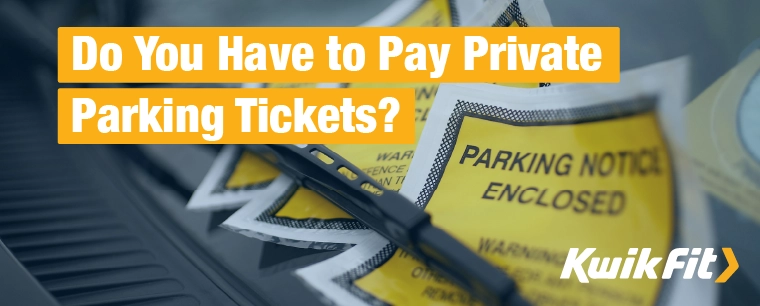Do You Have to Pay Private Parking Tickets?
Jack Dreyer | Wednesday 11th October 2023 12:00pm

Parking tickets are one of life’s many great joys, aren’t they? There are few things better than coming back from lunch with friends to see a lovely yellow sticker on your windscreen. But do you have to actually pay them?
Well, if you’re parked improperly (such as without a valid payment ticket) on land owned or operated by the local authority, then you do have to pay this back regardless. You may be able to dispute it if there’s a good reason why you didn’t pay for the metre or why you were parked there, but this really varies and, usually, public land usually has the parking rules quite well signposted, so you’re likely to be met with a shrug.
Private land like private car parks or driveways, however, are a different case. We always recommend you park in accordance with the rules of where you’re parking, but here’s what you need to know.
Some quick tips to avoid tickets
Before we go more into the types of parking ticket and what to do once you get them, the best thing to do is to be aware of how to not get them in the first place.
Whenever you’re parking, be sure to look out for any signposts stating parking restrictions and allowances on the road or in the area. If you’re parking in a car park, look out for signs that state the terms of parking.
Many car parks, for example, will have certain times in which you have to pay for tickets and other times that parking is free of charge (usually, after a certain time in the day or on weekends).
Parking on private land, like a private road, isn’t a criminal offence unless there’s a good case for “aggravated trespass” – which essentially means trespassing with the intent to cause harm or disruption. Trespassing without the aggravation, however, is still a civil offence so, while police may not press charges, you shouldn’t park on your neighbour’s drive.

Types of parking ticket
When you see your parking ticket, you should check who has issued it and what kind of notice it is.
A Fixed Charge Notice and Penalty Charge Notice is issued by a governmental authority and therefore has to be repaid. The most common type of notice you’ll see here will be the Penalty Charge Notice because this is the one issued for minor parking violations like parking without having paid or overstaying a paid window.
A Fixed Charge Notice is usually issued by police or local authorities for more serious traffic violations like driving dangerously (which can even be charged criminally by police officers), violating traffic rules (like going the wrong way up a one-way street), or parking on red route lines.
Owners and operators of private car parks aren’t authorised to issue Fixed or Penalty Charge notices. Instead, they can only issue Parking Charge Notices. These are, however, made to look near-identical to the government-issued ones, but be sure to keep the ticket and check the wording.
What can you do about parking tickets?
As we’ve said, if you’re looking at a government-issued notice, then your only options are to:
- Pay it within the given period
- Open a dispute for the ticket
If you choose to ignore a government-issued notice, it can escalate to a very costly mistake (and one that can potentially affect your licence in some instances).
With privately-issued Parking Charge Notices, you can choose to:
- Pay it within the given period
- Open a dispute for the ticket
- Do nothing and ignore the issuer
Let’s look at these in more detail.
Pay the ticket
In most cases, tickets issued by any issuer will have a short “discount” window of between 7–14 days, inside which you’ll be able to pay less. If you’re genuinely at fault, the easiest thing to do is to pay the charge within the window and move on.
Open a dispute for the ticket
If there’s a good claim that signage wasn’t adequate for you to reasonably understand the terms of parking, you can dispute the ticket. If you decide to do so, be sure to have taken plenty of pictures of the area and/or signage so that you can prove your claim.
Do nothing
While you’re not legally bound to pay the Parking Charge Notice at the point of its issuing, that doesn’t mean that doing nothing is a good option. The issuer will contact you again after the discount period (if there is one) and, on a lack of response, can choose to escalate the matter to a civil court. This can then result in a judge issuing a court order to pay the charge, plus added interest (which will have been stated in the terms of the notice), plus legal fees.
So, you can see, this could end up being much more costly than the ticket itself.
Need help with your car?
While we can’t help you out in court, we certainly can help you out on the forecourt. If you’re having any trouble with your car, bring it into your local Kwik Fit for expert servicing and repairs.
Any facts, figures and prices shown in our blog articles are correct at time of publication.
Featured Articles
Is it Illegal to Drive With One Headlight?
Saturday 19th July 2025
Wondering if it’s illegal to drive with one headlight? Learn about the safety risks and penalties of illegal blown bulbs and why you should fix them promptly.
Air Con in EVs & Hybrids: Experts Answer Your Questions
Monday 30th June 2025
Does air con drain EV batteries? Can you use the air con while charging an electric car? Find out the answers to these questions & more from Kwik Fit’s experts.
Why Is Your Car Making a Noise? Fixes & Tips
Friday 13th June 2025
When your car starts making unexpected noises, it can certainly be quite disconcerting; it may be nothing to worry about, but here’s what you need to know.









